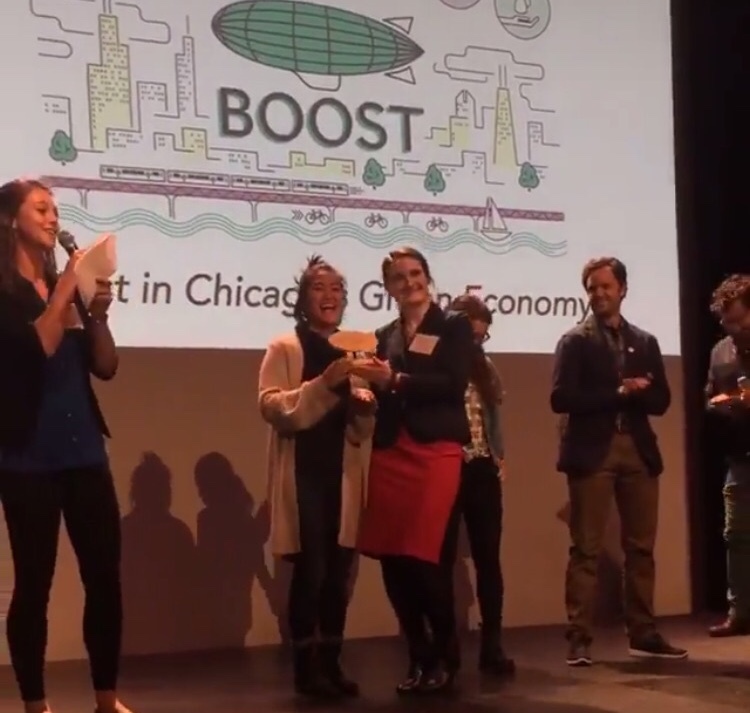
Trista Li receiving the 2018 BOOST award for her venture, KitcheNet.
BOOST 2020 is right around the corner! Taking place in November, this year’s event will be conducted remotely, though its basic substance remains the same: local entrepreneurs will pitch their sustainable social ventures, as registrants cast ballots to award $5,000 to one or two promising startups. Last year, BOOST raised nearly $30,000 to both help emerging entrepreneurs in sustainability and benefit Delta Institute’s mission of collaborating with communities across the Midwest to solve complex environmental challenges.
This year, we decided to check back in with previous winners about their ventures and the role BOOST played in their development. This week, we spoke with Trista Li, a 2018 BOOST finalist and founder of KitcheNet, an organization that delivers healthy fruits and vegetables to offices and homes while redirecting some of its proceeds to deliver the same foods, at no cost, to markets in local areas with limited or no access to fresh, healthy foods.
What inspired you to start KitcheNet?
We noticed that at the office, people usually only have access to shelf-stable foods and Snickers bars, and we really wanted to increase their access to healthy fruits and vegetables — really re-spark that connection with fresh foods. Then we realized we could use the same supply chains to provide these fresh foods to people living in food deserts, really making a difference in underserved communities. That’s the basis of our “dual impact” model: expanding corporate access to fresh foods while investing in local food deserts.
That’s incredible! How did BOOST aid this mission?
At the time of BOOST, we were literally hauling bins of fruit into the back of my car early in the morning. BOOST allowed us to hire a driver to take care of the deliveries, so we could focus more on KitcheNet’s business aspect. It provided some really crucial early capital and allowed us to scale up the business.
Do you remember anything in particular about BOOST?
Well, I graduated from the University of Chicago Booth School of Business, and of course the start-up culture there is one of the metrics — what are your costs, your overhead, your retention, et cetera. And at BOOST, I remember people were much more interested in the content of the venture, its sustainability, what kind of impact it was having. So that was a really important and reinvigorating aspect of the event. BOOST came at a crucial time; I was feeling very drained, and it showed me that our business was scalable and could succeed.
That’s so great to hear. What has the last year been like for KitcheNet?
We’ve advanced far in several competitions, including becoming a top 9 candidate for the American Heart Association’s EmPOWERED to Serve Accelerator, and becoming a top 70 finalist for The Rockefeller Foundation Food System Vision Prize (out of 1300 applicants!). We were also featured on WGN-9 as a delicious contribution to any remote or socially-distanced party.
What is KitcheNet up to now?
The coronavirus and widespread office closures have definitely thrown us for a loop. So far, we’ve been continuing free deliveries of fresh fruits and vegetables to food deserts, and have been committed to retaining all of our employees. Right now, we’re re-evaluating our model for new areas of growth, including increased business-to-consumer deliveries or deliveries to corporate cafeterias. If you are interested in an office or home delivery of fruit, let us know — we can definitely start figuring that out!
To sign up for KitcheNet deliveries, visit kitchenet.org or fill out their online form to learn more.
Please join us this November for BOOST 2020! A wide range of sponsorship options are now available for you to show support; contact Patrick Murphy at pmurphy@delta-institute.org for more information.

